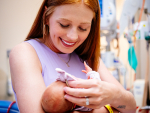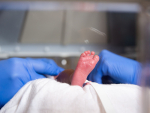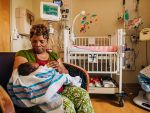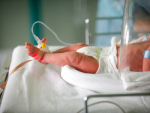Displaying items by tag: department of pediatrics
UAB researchers are combining behavioral change theories, telemedicine and extended reality as they work to improve the physical and mental health of children with disabilities.
Tagged under
A correlation was found between the social distancing index, a measure of overall social distancing behaviors observed, and higher rates of neonatal and early neonatal mortality, as well as preterm birth, when assessed with a lag period. Results were published today in JAMA Network Open.
When discussing serious medical topics with children, a UAB psychologist says it is important to keep it simple: use language they understand and let them guide the discussion.
Tagged under
Tagged under
As temperatures heat up, the risk of contracting a heat-related illness increases. Experts at UAB discuss the best ways to stay safe this summer.
Tagged under
Students enrolled in the UAB Department of Pediatrics Mini Medical School are immersed in hands-on learning about the wide variety of career opportunities in the health care field.
Tagged under
The annual race will be held Saturday, May 18, at Railroad Park. A virtual option will be offered this year.
Tagged under
The award recognizes those in the medical community who have made monumental contributions to cancer prevention, control research and practice.
Cooper recently won the Albert Lasker Award, known as “America’s Nobel Prize,” given to the living person considered to have made the greatest contribution to medical science.
Tagged under
At 15 months old, Brooke Miley Lillie received a heart transplant. At 19, she received a kidney. At 27, she defied the odds and delivered her first daughter at UAB Hospital.
Tagged under
- release
- department of surgery
- division of cardiothoracic surgery
- division of transplantation
- comprehensive transplant institute
- department of medicine
- division of cardiovascular disease
- division of nephrology
- department of obstetrics and gynecology
- division of maternal fetal medicine
- department of pediatrics
- division of neonatology
- women and infants services
- uab hospital
A UAB infectious diseases physician breaks down what you need to know about flu, RSV and COVID as people navigate colder months and have exposure to these viruses.
Tagged under
UAB Medicine hosted a ribbon-cutting ceremony to commemorate the new NICU Bookworms vending machine. United States Representative Terri A. Sewell (AL-07) joined the ceremony and read to infants in the UAB RNICU and Children’s of Alabama NICU.
Tagged under
While it has long been thought that the most direct health effect linked to the sanitation crisis in the Black Belt was due to soil-transmitted hookworm, a study led by UAB found no evidence of transmission.
Tagged under
Vivek Lal, M.D., associate professor in the Department of Pediatrics at UAB Heersink School of Medicine and the founder of both ResBiotic Nutrition and Alveolus Bio, was given the 2023 Award for Excellence in Entrepreneurship.
Tagged under
- release
- harbert institute for innovation and entrepreneurship
- school of medicine
- department of pathology
- department of pediatrics
- department of urology
- department of medicine
- division of pulmonary allergy and critical care medicine
- department of biochemistry and molecular genetics
- college of arts and sciences
- department of biology
- department of chemistry
- school of engineering
Researchers have identified a gut-lung axis driven by intestinal antimicrobial peptide expression and mediated by the intestinal microbiota that is linked to lung injury in newborns.
Tagged under
The UAB Neonatal Helping Hands program provides volunteers the opportunity to hold, rock, talk, sing and read to infants in the RNICU and CCN. The program, which was paused in 2020 due to COVID, has relaunched and is accepting volunteer applications.
Tagged under
New research from UAB shows a possible link between poverty and a child’s possibility of having a relapse in their acute lymphoblastic leukemia.
Tagged under
As one of only five universities selected, UAB joins the NIH’s first major program to address how structural and institutional factors of persistent poverty relate to cancer.
Tagged under
The baby boy, born in late May 2023, is the first baby born from a uterus transplant outside of a clinical trial and UAB’s first baby from its uterus transplant program.
Tagged under
- release
- university of alabama system
- uab medicine
- school of medicine
- transplantation
- comprehensive transplant institute
- department of surgery
- division of transplantation
- department of obstetrics and gynecology
- division of gynecologic oncology
- division of maternal fetal medicine
- division of reproductive endocrinology and infertility
- department of radiology
- department of pathology
- department of medicine
- division of infectious diseases
- department of pediatrics
- womens history
Published results from two UAB studies found the duration of intermittent hypoxemia events and the presence and persistence of a patent ductus arteriosus after birth are two novel risk factors of BPD-PH in preterm infants.



















